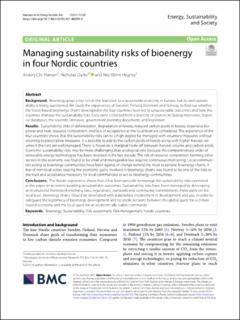| dc.contributor.author | Hansen, Anders Chr. | |
| dc.contributor.author | Clarke, Nicholas | |
| dc.contributor.author | Hegnes, Atle Wehn | |
| dc.date.accessioned | 2021-10-14T14:19:44Z | |
| dc.date.available | 2021-10-14T14:19:44Z | |
| dc.date.created | 2021-06-07T14:27:36Z | |
| dc.date.issued | 2021-06-07 | |
| dc.identifier.citation | Energy, sustainability and society. 2021, 11 . | en_US |
| dc.identifier.issn | 2192-0567 | |
| dc.identifier.uri | https://hdl.handle.net/11250/2823118 | |
| dc.description.abstract | Background Bioenergy plays a key role in the transition to a sustainable economy in Europe, but its own sustainability is being questioned. We study the experiences of Sweden, Finland, Denmark and Norway, to find out whether the forest-based bioenergy chains developed in the four countries have led to unsustainable outcomes and how the countries manage the sustainability risks. Data were collected from a diversity of sources including interviews, statistical databases, the scientific literature, government planning documents and legislation. Results Sustainability risks of deforestation, degradation of forests, reduced carbon pools in forests, expensive biopower and heat, resource competition, and lack of acceptance at the local level are considered. The experience of the four countries shows that the sustainability risks can to a high degree be managed with voluntary measures without resorting to prescriptive measures. It is possible to add to the carbon pools of forests along with higher harvest volumes if the risks are well managed. There is, however, a marginal trade-off between harvest volume and carbon pools. Economic sustainability risks may be more challenging than ecological risks because the competitiveness order of renewable energy technologies has been reversed in the last decade. The risk of resource competition harming other sectors in the economy was found to be small and manageable but requires continuous monitoring. Local communities acting as bioenergy communities have been agents of change behind the most expansive bioenergy chains. A fear of non-local actors reaping the economic gains involved in bioenergy chains was found to be one of the risks to the trust and acceptance necessary for local communities to act as bioenergy communities. Conclusions The Nordic experience shows that it has been possible to manage the sustainability risks examined in this paper to an extent avoiding unsustainable outcomes. Sustainability risks have been managed by developing an institutional framework involving laws, regulations, standards and community commitments. Particularly on the local level, bioenergy chains should be developed with stakeholder involvement in development and use, in order to safeguard the legitimacy of bioenergy development and reconcile tensions between the global quest for a climate neutral economy and the local quest for an economically viable community. Keywords: Bioenergy, Sustainability, Risk assessment, Risk management, Nordic countries | en_US |
| dc.language.iso | eng | en_US |
| dc.publisher | BMC | en_US |
| dc.rights | Navngivelse 4.0 Internasjonal | * |
| dc.rights.uri | http://creativecommons.org/licenses/by/4.0/deed.no | * |
| dc.title | Managing sustainability risks of bioenergy in four Nordic countries | en_US |
| dc.type | Peer reviewed | en_US |
| dc.type | Journal article | en_US |
| dc.description.version | publishedVersion | en_US |
| dc.rights.holder | © The Author(s) 2021 | en_US |
| dc.source.pagenumber | 23 | en_US |
| dc.source.volume | 11 | en_US |
| dc.source.journal | Energy, sustainability and society | en_US |
| dc.identifier.doi | 10.1186/s13705-021-00290-9 | |
| dc.identifier.cristin | 1914201 | |
| dc.relation.project | NIBIO - Norsk institutt for bioøkonomi: 52271.1 | en_US |
| dc.relation.project | Nordisk ministerråd: 2015-03) | en_US |
| dc.relation.project | Norges forskningsråd: 233640 | en_US |
| dc.relation.project | Norges forskningsråd: Forvaltning av skog for motvirkning av klimaendringer | en_US |
| dc.source.articlenumber | 20 | en_US |
| cristin.ispublished | true | |
| cristin.fulltext | original | |
| cristin.qualitycode | 1 | |

